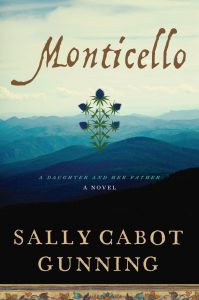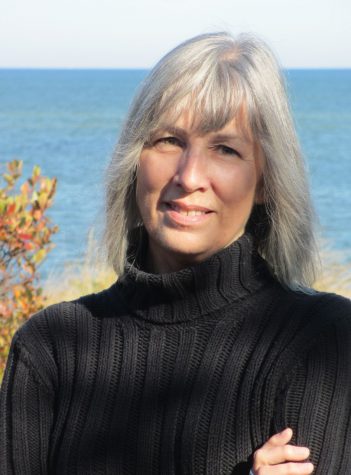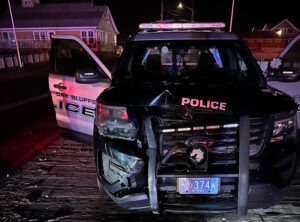AL: First of all, congratulations on your new book, MONTICELLO. You write on your web site that you stumbled into this book as you stumble into many of the novels you write. Can you talk a little more about that?
SG: Thank you, Anne! I don’t know if you have this same odd experience, but after years of work it’s seems so sudden when it actually appears on the shelf! Each of my historical novels led me to the next. While researching The Widow’s War I came upon a 1765 diary entry talking about the arrest of an indentured servant – I was able to track down the court records in the Mass. Judicial Archives and found quite a tale. While I was researching the workings of an 18th century courtroom for that novel (Bound) I came upon the Boston Massacre trial and a young woman who helped John Adams win his case defending the British soldiers. That turned into the Rebellion of Jane Clarke. The research for all three books brought me into Benjamin Franklin’s orbit – it’s a large orbit! When I discovered the identity of the biological mother of his illegitimate son was unknown, I had to attempt track that down in Benjamin Franklin’s Bastard. That novel left off with Franklin setting sail for France, but I was so fascinated with the man I kept on reading. In France I ran into Thomas Jefferson and his fourteen-year-old daughter Martha, so off I went after them next.
 AL: I know while researching the book you visited Monticello many times. I find that we can connect to places in ways we never anticipate and often have a physical reaction to them. Did this happen to you at Jefferson’s home?
AL: I know while researching the book you visited Monticello many times. I find that we can connect to places in ways we never anticipate and often have a physical reaction to them. Did this happen to you at Jefferson’s home?
SG: Very much. Each time I went I took away something else, but even knowing all the sadness that took place there I couldn’t help feel a sense of sanctuary. I’m sure that’s what Jefferson felt — or strived for. His daughter found her balance in it, and I felt that too. It’s not a place for noise; Monticello speaks volumes in its silence.
AL: What is the most surprising thing you discovered when researching the book?
SG: That they were all victims, black and white – of slavery, of love, of loss, of their own history.
AL: The first ten books you wrote were mysteries, the Pete Bartholomew series. How did you turn to writing historical novels?
SG: I started researching my family’s Cape Cod history and got hooked. I began to insert historical themes into the mysteries until around about book 11 I found myself struggling to find a place for the mystery. I took that as the sign to take a break from the mystery contracts and try an historical novel. I’m glad I did.
AL: Years ago, in your Bartholomew days, we were in the same writing group? Do you belong to a writing and book club now?
SG: No, I don’t. I’m always working on a book and I found it tended to upset my focus. I got too involved in what everyone else is doing. I do visit book clubs frequently and always have a terrific time.
AL: If you were to start a book club and were to invite six people (living or not, fictional or real) who would you invite and why?
SG: It’s funny, this reminds of that old line: “I could never join a club that would have me as a member.” I start thinking of people I’d like to join my club and I just know they never would. Like Harper Lee. I want to talk to her about her (?) decision to publish the prequel to Mockingbird, and I just know she’d say “None of your damned business!” But I’d definitely want you! We did have fun, didn’t we?! And Ann Patchett, Kent Haruf, Elizabeth Strout, Stewart O’Nan. Elinor Lipman. I can just hear her now. Laughter is key.
AL: What would be the first book you would choose to read and discuss and why?
SG: I’d have to think about that one for a couple of years! Having said that, the thought pops into my head that the book I’d most like to hear the above group discuss is Monticello. This doesn’t come from an egocentric place – it’s just that there’s so much in there that could bring on rousing discussion.
AL: What are you reading now?
SG: Queen of the Night by Alexander Chee. He and I will be having a “Conversation” at the Provincetown Book Festival September 17th, and I’d never read him before. What an amazing writer.
AL: Can you name five books you would recommend, books that changed the way you thought about something because you read them?
SG: OUR SOULS AT NIGHT by Kent Haruf. PEOPLE OF THE BOOK by Geraldine Brooks. THE BURGESS BOYS by Elizabeth Strout. RUN by Ann Patchett. THE GOOD WIFE by Stewart O’Nan. As I look at this list I see a recurring theme running through these books – finding one’s peace, finding the good in the things and people and places around us even when it seems there is none. There are other books I loved because of the beautiful writing or the enthralling story or the wit – preferably all three! But they don’t always profoundly change the way I think about something. Most recently I think of Dawn Tripp’s GEORGIA as one of those.
























I am reading Monticello now and can’t put it down!!